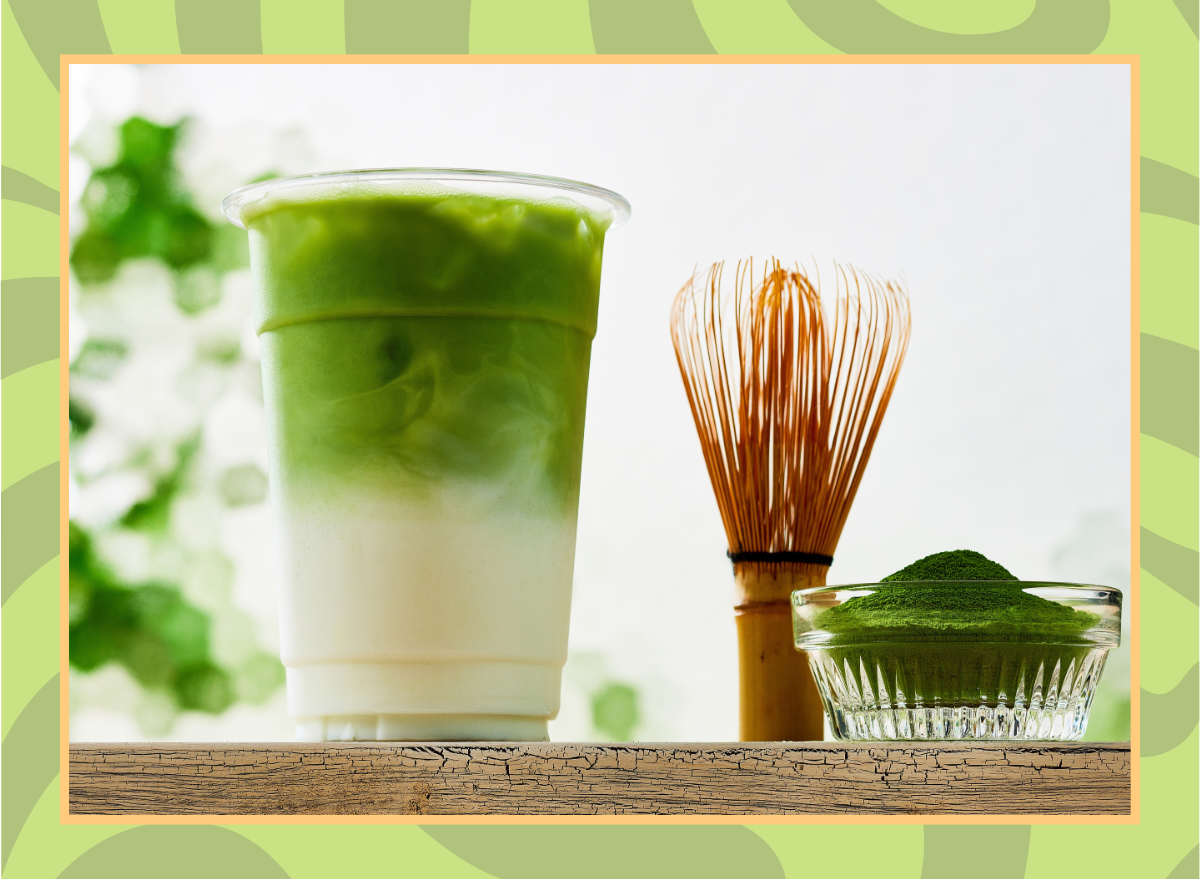The word “healthy” doesn’t mean the same thing to everyone, especially when it comes to nutrition. While some may perceive a high-protein diet as healthy, others may prioritize plant-based eating. The same is true for foods—there’s no universal definition of “healthy,” but many earn the label based on their perceived benefits. However, many foods and drinks marketed as healthy can lead to weight gain if not consumed in moderation.
Take fats, for example. Some oils are loaded with heart-healthy fats that we should be incorporating into our meals. However, consuming too much of these oils can lead to a high calorie intake as a single tablespoon adds over 100 calories. Two things can be true at once: a food can provide health benefits while also contributing to weight gain.
To help you make the most of the foods you eat without causing the scale to creep up, here are 10 “healthy” foods that can actually make you gain weight. Read on, and for more, don’t miss 14 ‘Diet’ Foods That Are Actually Unhealthy for You.
Acai Bowls
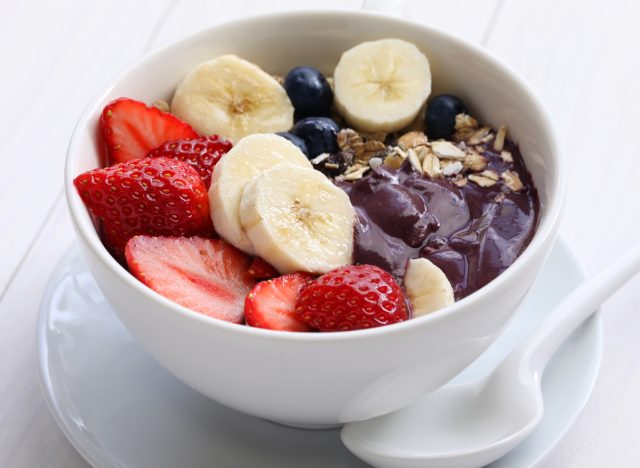
Gaining tons of popularity over the last several years, acai bowls are another perceived “health” food. Loaded with fruits and topped with ingredients like chia seeds, nuts, and granola, acai bowls are a source of healthy fats, antioxidants, and fiber. While these are important nutrients, acai bowls often come along with a high calorie and sugar count. Much of the sugar is naturally occurring in the fruit, but the added sugar used to sweeten the bowl can be a problem for your waistline. Not to mention, with calorie counts that can far exceed 600 calories depending on toppings, this food can put you over your calorie needs pretty quickly.
To lower the sugar and calories in your bowl, make sure they aren’t adding any sugar to the fruit blend, and limit your toppings.
Matcha Lattes
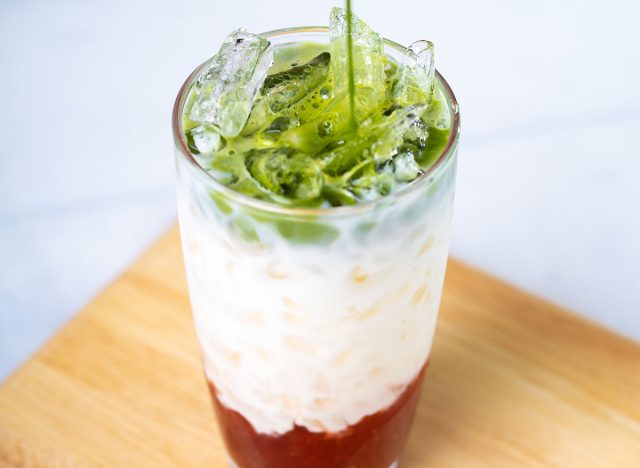
This powdered green tea has gained popularity in recent years because of its antioxidants and natural caffeine. Whisking this powder into warm water and enjoying as-is is the best way to get all of the health benefits without the calorie-dense ingredients. However, most people enjoy matcha when served as part of a latte. This means the antioxidant-rich powder is now potentially served alongside loads of added sugar.
In fact, a large Iced Matcha Latte from Dunkin has 43 grams of sugar while a grande Starbucks matcha latte packs 29 grams of sugar (with 39 grams of sugar in a Venti!), which is more than you should have in an entire day!
If you enjoy your matcha in latte form, forgo those syrups and sugar, and instead serve with your milk of choice.
Granola
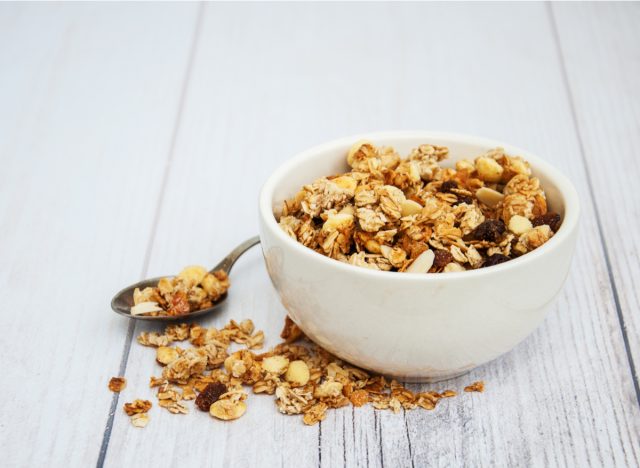
Perhaps one of the longest standing manufactured foods with a reputation for being healthy, traditional granola is a mix of oats, nuts, seeds, and dried fruit. While each of these foods provides its own unique health benefits, the downside of granola mostly comes from the added sugar and oil used as binders in the crunchy cereal alternative. The combination of these ingredients makes for a high calorie food, often with high amounts of added sugar and little protein. For example, Kroger’s Simple Truth Mixed Berry Granola packs 20 grams of added sugar per serving and only 4 grams of protein.
There are granola options out there with less added sugar, so keep an eye out for those as healthier alternatives. A good rule of thumb is to choose options with fewer than 8 grams of added sugar per serving. You could also experiment with making your own granola at home as a healthier way to enjoy this classic treat.
Red Wine

Red wine, often touted for its antioxidant properties, could be contributing to weight gain. Not only does a single glass provide more than 100 calories, but the way your body uses alcohol as an energy source may result in other nutrients being stored as fat. The combination of empty calories and energy metabolism effects of wine make it a likely source of weight gain.
If you enjoy a glass of red wine with dinner, try limiting yourself to just one. And if you’re justifying the calories for the antioxidants, think again—you’re better off getting antioxidants from supplements or nutrient-rich foods while keeping your red wine consumption in check.
MCT Oil
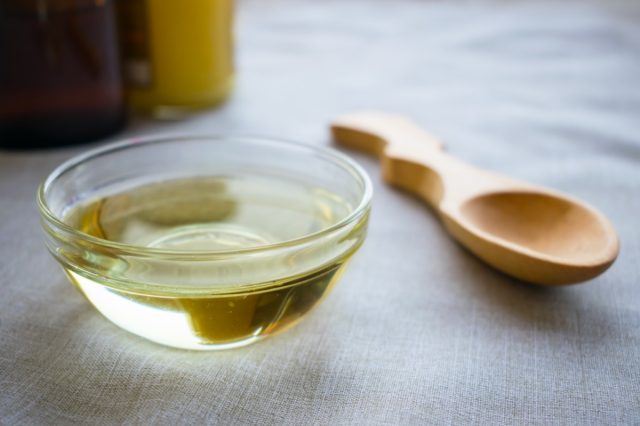
When the ketogenic diet gained popularity years ago, so did the use of MCT oil. Medium chain triglycerides (MCT) are a type of fat that can be used for immediate energy, which is not true for most other types of fat. While this unique absorption may allow it to aid in weight loss when used in place of other oils, this method could potentially back fire. A single tablespoon of MCT oil provides about 120 calories. Adding multiple servings of this oil to your meals can result in eating excess calories pretty easily, which could promote weight gain.
If you want to reap the health benefits of MCT oil, swap it for an oil currently used in your diet to avoid adding in excess calories to your day.
Protein Bars

A convenient food that can sometimes be used to replace a whole meal, protein bars may also be causing you to gain weight. While they provide important nutrients, like protein and fiber, they can also be a dense source of calories and contain added sugar. In fact, some popular bars, like Gatorade’s Protein Bars, pack a day’s worth of added sugar, based on the American Heart Association’s recommendation for women.
The convenience of a protein bar is hard to beat, so if you want to incorporate this on-the-go snack into your meal plan, be mindful of your choice. Look for healthy protein bars with fewer than 5 grams of added sugar, at least 10 grams of protein, and 3 grams of fiber. If you are using the bar as a quick snack, it should be under 200 calories, too.
Flavored Oatmeal
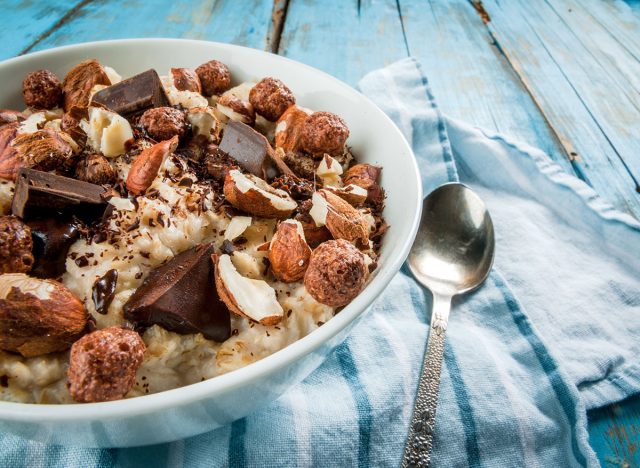
Oatmeal is a notable source of fiber, and also packs some plant-based protein. It can be combined with healthy fats, like nuts and nut butter, and fruit to create a well-balanced, quick breakfast. However, options that have flavoring usually come along with several grams of added sugar. Some of the most popular flavors can provide 22 grams of total sugar and 17 grams of added sugar, making them a food that could aid in weight gain. Added sugar has been linked to obesity and weight gain in many demographics, and even chronic disease.
Instead of flavored oatmeal packets, stick with a plain variety and sweeten it naturally with fruit and a light drizzle of honey.
Flavored Yogurt
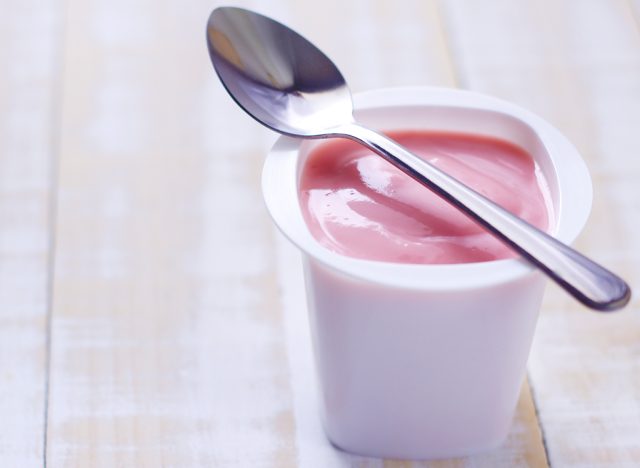
Yogurt can be a good source of protein, and provide important nutrients, like calcium. However, flavored yogurts can also supply a shocking amount of added sugar. For example, The Greek Gods Strawberry with Honey Greek yogurt packs 15 grams of added sugar per serving. This added sugar contributes empty calories, making it a less filling option. And traditional yogurts with high sugar content and less than 5 grams of protein per serving are even worse. These options offer minimal nutritional value and are more likely to contribute to weight gain.
If you enjoy yogurt in your meal plan, go with a plain variety and added mashed frozen fruit as a natural sweetener. There are options that make low sugar flavored varieties, so keep an eye out for those when you need a quicker snack.
Dried Fruit
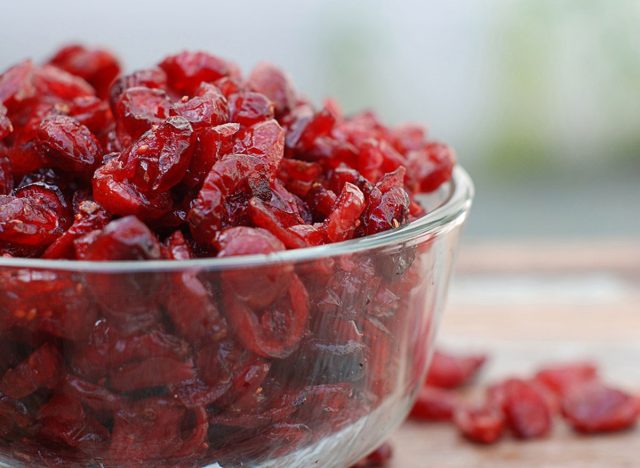
Dried fruit contains fiber, iron, and a variety of other vitamins and minerals. Unfortunately, dried fruit can also be a concentrated source of added sugar and is not especially filling when eaten on its own. In fact, classic Ocean Spray Craisins pack 26 grams of added sugar per serving! Whether you are using dried cherries to make your homemade granola, or adding dried cranberries to your autumn salad, check the nutrition facts before purchasing your next pack of dried fruit.
Choose options with zero grams of added sugar, and always make sure to pair your dried fruit with a source of protein or fat to make it more filling. For example, a portion of dried mango dipped in almond butter or dried cherries combined with your favorite nuts will make for a more balanced snack.
Electrolyte Drinks

With so many options on shelves today, you may have been told how important it is to drink a daily electrolyte supplement. The reality is, most people don’t need to consume these on a regular basis. Not only can they provide excess sodium to your day, a nutrient most people are already consuming too much of, but they can also pack in the sugar. Options with lower amounts of sodium and minimal added sugar, like NUUN Daily Hydration, offer modest electrolyte replenishment without contributing significant amounts of electrolytes and sugar to your day.
If you are especially active or have a heavy sweat rate, electrolyte drinks may be beneficial for you. However, most of us can meet our fluid and electrolyte needs with just water. This avoids the excess sugar found in many electrolyte supplements, and keeps you from overdoing it on certain nutrients.

